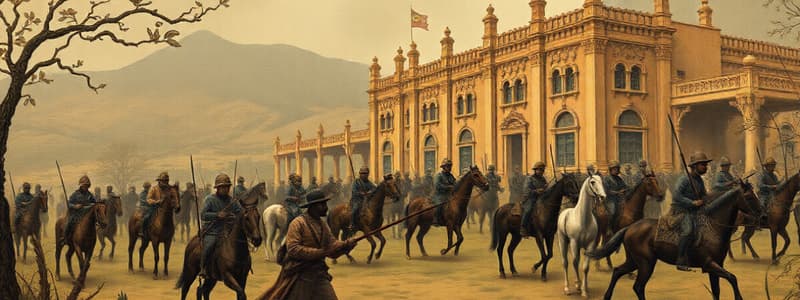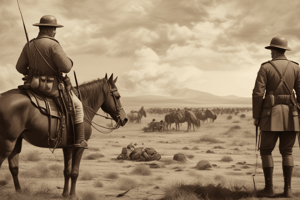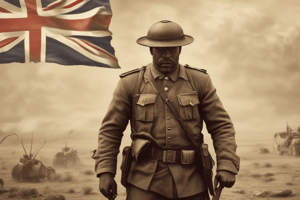Podcast
Questions and Answers
What was the primary demand made by the African newspaper editors during the South African Native Convention in 1909?
What was the primary demand made by the African newspaper editors during the South African Native Convention in 1909?
- Voting rights for all men (correct)
- Economic independence from the British
- End of colonial rule
- Recognition of African chiefdoms
Which prominent figure in the early 20th century took a delegation to London to advocate for black South Africans' rights?
Which prominent figure in the early 20th century took a delegation to London to advocate for black South Africans' rights?
- Walter Rubusana
- William Jabavu
- Albert Luthuli
- Mahatma Gandhi (correct)
What was a significant outcome of the Boer War for black South Africans?
What was a significant outcome of the Boer War for black South Africans?
- Recognition of African languages
- Formation of an independent state
- Betrayal of their hopes for improved rights (correct)
- Increased political representation
What percentage of the South African population was made up of white people according to the population distribution mentioned?
What percentage of the South African population was made up of white people according to the population distribution mentioned?
How did the British government respond to the demands of black South Africans after the Boer War?
How did the British government respond to the demands of black South Africans after the Boer War?
What did the agreements for the Union of South Africa fail to consider?
What did the agreements for the Union of South Africa fail to consider?
Which of the following accurately describes the portrayal of the union in South Africa?
Which of the following accurately describes the portrayal of the union in South Africa?
What misconception might arise from using only photographs to depict the Union of South Africa?
What misconception might arise from using only photographs to depict the Union of South Africa?
What was a major misconception among the Boers regarding their relationship with the British during the war?
What was a major misconception among the Boers regarding their relationship with the British during the war?
What was one of the key outcomes of the Peace Treaty of Vereeniging?
What was one of the key outcomes of the Peace Treaty of Vereeniging?
How did the war contribute to the establishment of racial policies in South Africa?
How did the war contribute to the establishment of racial policies in South Africa?
What was a significant challenge faced by Boer commandos towards the end of the war?
What was a significant challenge faced by Boer commandos towards the end of the war?
What was a consequence of British control over the gold mines after the war?
What was a consequence of British control over the gold mines after the war?
What was one of the primary goals of Lord Milner following the war?
What was one of the primary goals of Lord Milner following the war?
What was the implication of the South Africa Native Affairs Commission's suggestions in 1905?
What was the implication of the South Africa Native Affairs Commission's suggestions in 1905?
What role did the perception of Black contributions play in the post-war political landscape?
What role did the perception of Black contributions play in the post-war political landscape?
What was one of the primary motivations for the implementation of the Native Land Act of 1913?
What was one of the primary motivations for the implementation of the Native Land Act of 1913?
Which of the following best describes the land ownership available to Black South Africans after the Native Land Act?
Which of the following best describes the land ownership available to Black South Africans after the Native Land Act?
What was one significant effect of the Labour Act following the Native Land Act?
What was one significant effect of the Labour Act following the Native Land Act?
What action did the South African Native National Congress (SANNC) take in response to the Native Land Act?
What action did the South African Native National Congress (SANNC) take in response to the Native Land Act?
What was the primary focus of Sol Plaatje's work after the passing of the Native Land Act?
What was the primary focus of Sol Plaatje's work after the passing of the Native Land Act?
How did the Beaumont Commission contribute to the understanding of the land situation for Black South Africans?
How did the Beaumont Commission contribute to the understanding of the land situation for Black South Africans?
What was a consequence faced by individuals who were forced off their land due to the Native Land Act?
What was a consequence faced by individuals who were forced off their land due to the Native Land Act?
What was one of the main findings of Sol Plaatje during his travels across South Africa?
What was one of the main findings of Sol Plaatje during his travels across South Africa?
Study Notes
Primary and Secondary Sources
- Primary sources offer specific details and insights into particular moments, providing a sense of the attitudes and styles of the time.
- Secondary sources analyze broader trends, make comparisons, and offer interpretations.
The Boer War
- The British believed that the Boers were different from them and that their contributions were essential in winning the war.
- Many Black South Africans hoped that British victory would lead to political rights but were disappointed when the British left the decision of Black voting rights to the Boers.
Research
- Black heroes of the war
- Concentration camps
- The life of the average British soldier
- Black experiences of the war
- Boer generals and their tactics
- The main battles of the war
End of the Boer War and the Treaty of Vereeniging
- By 1902, Boer commandos were running low on supplies and were struggling to continue fighting due to lack of food and shelter.
- The war was costing Britain a significant amount of money, making the need for peace negotiations an urgent priority.
- On May 31, 1902, the British and the Boers signed the Treaty of Vereeniging.
- The British promised to provide financial assistance to help the Boers rebuild their farms.
Boer Political Rights
- The treaty granted the Boers the ability to elect their own government.
- The Boer government decided that Black South Africans would not be granted the right to vote.
The Union of South Africa
- The Union of South Africa was formed in 1910, incorporating the four separate British colonies.
- White political control dominated the Union at the expense of Black citizens.
- The South African Native Affairs Commission was established in 1903 to create a unified policy regarding Black people.
- The commission proposed a system where voting rights in the Cape would not apply to other colonies and segregation of black and white communities would be mandated.
Lord Milner
- Lord Milner was appointed by the British government to implement policies in South Africa after the war.
- The British government's first goal was to resume mining operation, and some black workers refused to return, having regained land during the war.
- Indentured laborers from China were brought to the mines, which sparked a strike from white workers fearing the loss of their jobs.
Black South African Resistance to the Union
- Many Black South Africans protested against the Union, believing it would prevent the Cape franchise system from expanding across the newly formed country.
- In 1909, three African editors (Rubusana, Jabavu, and Dube) organized the South African Native Convention in Bloemfontein.
- The convention demanded voting rights for all men and the end of racial discrimination.
Gandhi and the Union
- In 1909, Mahatma Gandhi led a delegation to London to advocate against racial discrimination in South Africa, but their efforts were rejected.
- On May 31, 1910, the four colonies unified as the Union of South Africa, becoming part of the British Empire.
- The hopes of Black South Africans for greater freedoms were dashed.
The Native Land Act of 1913
- The Native Land Act of 1913 was designed to maintain white economic control while already holding political power.
- The act severely restricted the areas where Black South Africans could own or lease land, limiting them to reserves which constituted only 7% of the total land.
- It also prohibited Black people from buying land in South Africa.
Economic Impact of The Native Land Act
- The Native Land Act disrupted the existing sharecropping system, which had allowed Black farmers to work white-owned land and earn a profit.
- The Labor Act enforced by the government put an end to sharecropping, forcing Black farmers to work as laborers on white-owned farms, mines, or relocate to the reserves.
- The reserves were overcrowded and offered limited job prospects, leading many to relocate to work in cities, towns, or on farms and mines.
- The shortage of work in the reserves led to the selling of livestock for survival, making wage labor the only remaining option.
Reaction to the Land Act
- In 1912, the South African Native National Congress (later renamed the ANC) was formed to advocate for change.
- SANNC leaders met with government officials to plead for an alteration to the act, but their efforts were ignored.
- The SANNC enlisted a lawyer, Richard Msimang, to compile a list of people who were forced off their land, detailing their possessions and livestock.
- The investigation revealed that people were given a mere 10 days' notice to vacate their land, losing homes, schools, and churches without any compensation.
Migration to Bechuanaland
- Thousands of Black South Africans fled their land and sought refuge in Bechualand, a British colony.
- In 1914, the SANNC made a direct appeal to the British government to overturn the South African regulations, but this was rejected.
- A delegation, including Sol Plaatje, traveled to London to plead their case, but they were unsuccessful.
Sol Plaatje
- Plaatje was born in 1876.
- He worked as a court interpreter and journalist.
- Plaatje documented the treatment of Tswana people under the British during siege of Mafikeng.
- He was a founding member of the SANNC and became its first general secretary.
- He traveled around Kimberley and Johannesburg by bicycle to assess the effects of the Native Land Act.
- After traveling to the USA and Britain, Plaatje educated people about the deplorable living conditions of Black South Africans.
Studying That Suits You
Use AI to generate personalized quizzes and flashcards to suit your learning preferences.
Related Documents
Description
Explore the complexities of the Boer War through primary and secondary sources. This quiz covers various aspects including the experiences of Black South Africans, key battles, and the significant decisions leading to the Treaty of Vereeniging.




